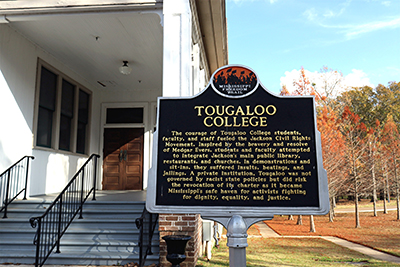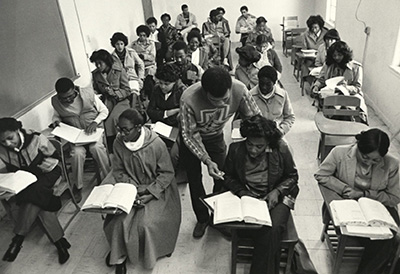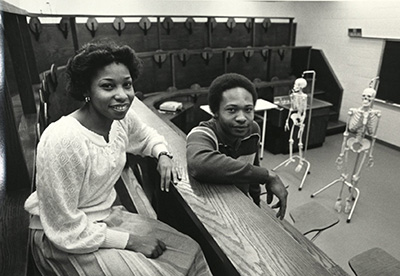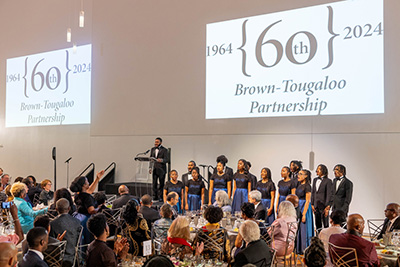Early 1960s

As the only Black college in Mississippi not under state control, Tougaloo College played a pivotal role in the Civil Rights Movement. Leaders often used the campus for meetings integral to the cause. Tougaloo students and faculty protesting racial discrimination conducted some of the first sit-ins in Jackson.
1963
- Increased action by leaders in the Civil Rights Movement and Tougaloo College's involvement created both national and local attention on this institution and the movement. State officials accused the school of fostering “agitation” rather than education.
- Brown President Barnaby C. Keeney was approached by members of the Tougaloo Board of Trustees and invited to investigate ways in which the talents and resources of Brown might be made available to help develop Tougaloo’s resources.
- The institutional relationship began with conversations between a Brown staff member and the President of Tougaloo that broadened to involve a visit to Tougaloo by other Brown University staff who developed a detailed survey of Tougaloo’s resources based on interviews with students, faculty and administration.
- In November, members of the Tougaloo faculty, administration and Board of Trustees formally visited Brown, meeting individually and as a group with their Brown counterparts.
1964
- In response to tensions over activism, the Mississippi state legislature introduced bills to revoke Tougaloo’s charter and prevent its graduates from taking the required state teacher’s exams.
- Several individuals with connections to Tougaloo and Providence convened to provide support to Tougaloo as it confronted political threats to its charter and students. This was realized through the creation of the Rhode Island Friends of Tougaloo group. It was formed by Irving Fain, Providence businessman, and his wife Macie Fain, who was born and raised in Hattiesburg, Mississippi. The group also included the Rev. Larry Durgin, minister of Providence’s Central Congregational Church and a part of the Tougaloo College Board through his work with the American Missionary Association. The group aimed to support Tougaloo College financially.
- In April, Tougaloo faculty, administrators and trustees conducted a second formal visit to Brown.
- Later that spring, Brown President Barnaby C. Keeney brought the matter of a working relationship with Tougaloo before the Brown faculty.
- In June, Tougaloo professor Harold W. Pfautz was appointed as the director of the Tougaloo-Brown Cooperative Program by the boards of trustees of both institutions.
1965
- The cooperative program between Tougaloo and Brown emphasized the need for financial assistance to historically Black colleges and universities (HBCUs), bringing federal attention to the issue.
- Title III of the Higher Education Act in 1965 addressed the need for financial assistance by allocating more funding to HBCUs. Harold Pfautz, Brown professor of sociology and early director of the Brown-Tougaloo program, gave testimony for this legislation.
Mid- to late 1960s

After receiving funding from the Ford Foundation in 1964, student exchanges began between Tougaloo and Brown. The program placed undergraduate students on either campus, where they both benefited from new academic and cultural experiences.
1976

The Early Identification Program, which admits Tougaloo students to the Brown medical school, was started by Dr. Stanley Aronson, dean of the medical school, and Richard McGinnis, chemistry professor at Tougaloo.
2004
In May, Brown-Tougaloo Partnership community members celebrated the partnership’s 40th anniversary by convening at Tougaloo College.
2005
Students, along with a group of faculty and staff, all from Brown University and Tougaloo College, launched Freedom Now!: An Archival Project of Tougaloo College and Brown University.
2007
Peter Bernstein, a member of the Advisory Council on Relations with Tougaloo College, and others provided a gift to Brown to found the Bernstein Scholars Program, which funds research projects led by Tougaloo students that foster the Brown-Tougaloo Partnership.
2014
- Brown University’s Sigma Xi honor society began inducting high-achieving science students from Tougaloo College.
- Brown University President Christina H. Paxson and Tougaloo College President Beverly W. Hogan signed a proclamation re-establishing the commitment of both institutions to the partnership.
- In November, the Brown-Tougaloo community celebrated the partnership’s 50th anniversary by convening in Providence.
2018
The Swearer Center for Public Service at Brown University began offering its Civil Rights Movement Trip to Tougaloo. This trip was originally hosted by Associate Professor of Africana Studies and History Francoise Hamlin, from 2011-2018, in coordination with her Civil Rights Movement class.
2019
The Brown University Division of Pre-College entered into a partnership with the Jackson Public Schools (JPS)-Tougaloo Early College High School.
2020
The Brown University School of Public Health established Health Equity Scholars, a scholarship and leadership program for Master of Public Health students aimed at addressing disparities in health systems and outcomes.
2024

In June, the Brown-Tougaloo community celebrated the partnership’s 60th anniversary by convening in Washington, D.C. During the convening, Galen V. Henderson was honored and memorialized as both an alumnus of Brown University and Tougaloo College and for his contributions throughout his life.